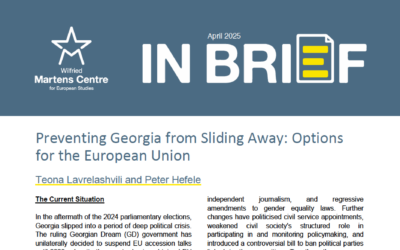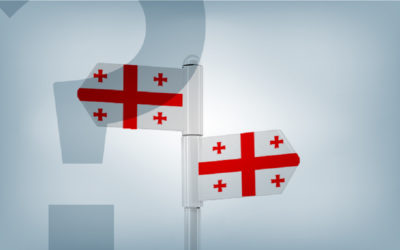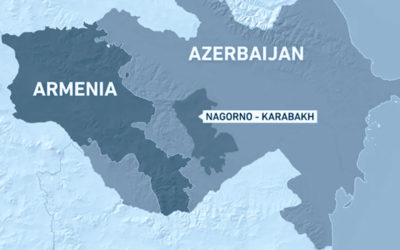 Loading...
Loading...-
In the aftermath of the 2024 parliamentary elections, Georgia slipped into a period of deep political crisis. The ruling Georgian Dream (GD) government has unilaterally decided to suspend EU accession talks until 2028 – despite the country having obtained EU candidate status in December 2023. This triggered mass unrest and raised serious concerns over Georgia’s democratic trajectory.
Framed by GD as a move to protect national sovereignty from so-called undue external influence, the suspension is widely interpreted as a rejection of the EU’s reform conditions and a pivot away from democratic commitments and sliding back into the Russian sphere of influence. The decision has intensified domestic polarisation, with large swaths of the population viewing it as a betrayal of Georgia’s path to Europe. Protests have erupted nationwide, continuing for over 126 days. Demonstrators demand snap elections, increased accountability, and a recommitment to democratic norms. Over 500 individuals have been detained for participating in the protests. Among them, more than 50 have been charged with criminal offenses such as organising group violence, attacking police officers, and property damage. Several activists and journalists remain in custody under questionable charges.
In parallel with suspending EU accession talks, the GD government has adopted a package of legislative measures without due public consultations, to further undermine democratic governance. These include a Foreign Agents Registration Act targeting civil society, restrictions on foreign funding for media that threaten independent journalism, and regressive amendments to gender equality laws. Further changes have politicised civil service appointments, weakened civil society’s structured role in participating in and monitoring policymaking, and introduced a controversial bill to ban political parties linked to the opposition. Together, these moves represent a clear drift toward authoritarian consolidation and a sharp departure from European democratic values.
Democracy Eastern Partnership Foreign Policy
Preventing Georgia from Sliding Away: Options for the European Union
IN BRIEF
03 Apr 2025
-
In a stunning and deliberate pivot, Georgia’s government has effectively slammed the brakes on its European integration journey. Yesterday, Prime Minister Irakli Kobakhidze announced that the ruling Georgian Dream (GD) party would suspend starting EU accession talks until 2028 and refuse European budgetary support. This declaration follows a cascade of alarming developments, including widespread allegations of electoral fraud during the October 26 parliamentary elections and an increasingly critical stance from Brussels regarding Georgia’s democratic backsliding.
By framing this decision as a defence against external interference, the GD leadership has sent a clear and unambiguous message: the government is no longer officially pursuing EU integration. This development marks the culmination of what can be described as a constitutional coup, evident in two key aspects.
First, it directly contradicts Article 78 of the Constitution of Georgia, which enshrines EU membership as an irreversible path for the country. Second, the first session of the Parliament was convened without the approval of the President, despite the Constitution not granting any authority to Parliament to act as a substitute in such circumstances.
Democratic Backsliding: A Calculated Retreat
The October 26 elections were more than a litmus test for democracy—they became a stage for its systematic dismantling. Reports from international observers detailed voter intimidation, breaches of ballot secrecy, vote buying, and other irregularities. The opposition, rejecting the results, has boycotted parliament, while President Salome Zurabishvili has taken the unprecedented step of challenging the elections in the Constitutional Court, citing violations of ballot secrecy and the disenfranchisement of Georgian expatriates.
These developments do not reflect a broken system but rather a deliberate strategy by Georgian Dream to consolidate its grip on power. The decision to appoint a new president—bereft of diplomatic experience, lacking even a university degree, and best known for championing the Russia-inspired “foreign agents” law – sends a clear and unapologetic signal to Brussels that GD has little interest in maintaining its European trajectory. Loyal to GD and its oligarchic backer Bidzina Ivanishvili, this figure’s selection stands in sharp contrast to the current President, Salome Zurabishvili, who will be the last directly elected President of Georgia and whose mandate expires in a month. Known for her pro-Western orientation, Zurabishvili has become a thorn in the ruling Georgian Dream party’s side while simultaneously serving as a unifying figure for Georgia’s fragmented opposition.
GD’s retreat from European norms is deliberate and methodical. By portraying EU integration as a threat to Georgian sovereignty, the government appeals to conservative values and exploits national pride. Framing EU membership as contingent on adopting liberal policies such as same-sex marriage, the ruling party positions the EU as an antagonist meddling in Georgia’s domestic affairs. This rhetoric seeks to undermine public support for EU membership, even as 80% of Georgians continue to view the EU as a path to prosperity and security.
EU Response So Far
The European Union has responded with growing alarm but measured action. It has not recognised the results of the October 26 elections, apart from Hungarian Prime Minister Viktor Orbán—who prematurely congratulated Georgian authorities before the official results were announced. The EU has announced the deployment of a technical mission to investigate the reported irregularities and electoral fraud.
Yesterday, the European Parliament adopted a resolution condemning the elections, calling for new elections, and recommending sanctions against GD leaders for democratic backsliding, electoral violations, and abuse of state resources. The resolution also urged the EU to reassess its visa facilitation agreement with Georgia, warning of a potential suspension if democratic standards continue to erode.
Predictably, this resolution provoked a strong reaction from Georgian Dream. Prime Minister Kobakhidze seized on the resolution as a pretext to halt accession talks entirely, portraying it as evidence of Brussels’ undue interference. This calculated act of defiance fits seamlessly into the government’s broader narrative of sovereignty under siege- an argument strategically deployed to rationalise its increasingly authoritarian grip on power.
The Stakes for Georgia’s Future Could Not Be Higher
The decision to freeze EU accession talks until 2028 will isolate Georgia internationally while deeply undermining the aspirations of its people. For ordinary Georgians, EU integration is not an abstract ideal but a tangible hope for economic stability, freedom, and democratic governance. Yet, the ruling party’s actions have thrown these aspirations into jeopardy, creating a growing chasm between a government entrenched in power and a population yearning for a European future.
Protests erupted throughout Georgia after the PM’s announcement. With protests becoming stronger, riot police started gathering close to the Parliament building and the Freedom Square and started dispersing the rally with tear gas, pepper spray and water cannons. The rally will resume today.
The EU Foreign Affairs Council (FAC) meeting on December 16 is set to discuss Georgia once again. The EU Ambassador to Georgia has stated that “all options are on the table,” including the potential suspension of visa liberalisation.
Yet, the potential suspension of visa liberalisation—a step the EU may take if democratic backsliding persists—would disproportionately harm ordinary Georgians, restricting their ability to travel, study, and work in Europe. Meanwhile, the ruling elites, insulated by wealth and power, remain largely unaffected. This dynamic threatens to deepen public disillusionment and political polarisation in a country already grappling with fragile institutions.
Not An End!
The decision to halt Georgia’s EU integration is not a decision by Georgia, but a unilateral choice by the ruling party – yet it is a watershed moment in the nation’s history. The choices made today will reverberate for decades, shaping Georgia’s political trajectory, economic prospects, and role on the global stage. This is a pivotal juncture, determining whether the country continues its journey toward Europe or falls back into the orbit of imperialist Russia.
Therefore, this moment cannot and should not mark the end of Georgia’s European story. Instead, it serves as a stark reminder of democracy’s vulnerability. Whether this turning point is remembered as the day Georgia abandoned Europe, or as the beginning of its return towards the EU will depend on the resilience of its people, but first and foremost on the commitment of its international allies.
Now is the time for the EU to reaffirm its commitment to the Georgian people and their European dream. This requires a strategy that moves beyond rhetoric – one that mobilises civil society, empowers grassroots movements, and draws on the strength of the Georgian diaspora to bridge the growing divide between Georgia and Europe. Such a vision must inspire and sustain those of us who continue to believe in the promise of a democratic, European future for our country – one that will bring it closer to becoming an integral part of the European Union.
Teona Lavrelashvili Democracy Eastern Partnership Enlargement EU-Russia

Teona Lavrelashvili
It’s Official, Georgia Closes the Door to the EU: The EU Needs a Strategy
Blog
29 Nov 2024
-
The political climate in Georgia teeters on the edge of a dangerous precipice. On 14th of May, the ruling Georgian Dream party passed the “Law on Transparency of Foreign Influence”, a measure reminiscent of Kremlin-style governance.
Widely referred to as the “Russian Law” and “Foreign Agents Law”, it has faced strong opposition both domestically and internationally, casting a dark cloud over Georgia’s democratic aspirations and its pursuit of closer ties with the European Union. This law was hastily pushed through in a parliamentary session lasting just a minute and a half, amidst chaotic scenes within and outside the parliament building, where riot police used tear gas to disperse protesters and MPs engaged in physical squabbles.
What is wrong with the law?
The law’s adoption isn’t inherently hazardous, aside from its problematic wording and several objectionable clauses. In fact, in a well-established democracy, a revised version of this law might even prove beneficial. Yet, without the essential checks and balances, and with a judiciary that is subordinate to an overly dominant executive branch, this legislation could easily lay the foundation for oppressive measures, much like those seen in Russia.
Although the term “agent” has been removed, the newly named “Law on Transparency of Foreign Influence” retains problematic elements that could be exploited to suppress critical voices. Organisations receiving more than 20% of their funding from foreign sources are required to register as “organisations serving the interests of a foreign power.” This stipulation not only stigmatises these groups but also threatens to polarise Georgian society, fostering divisions and radicalisation.
Particularly alarming is Article 8 of the law, which grants the government extensive powers to interfere in the activities of these organisations without clear mandates or oversight. This could lead to an abuse of power reminiscent of authoritarian regimes. The Minister of Justice is empowered to monitor these organisations based on very broad criteria, including potentially any statement from virtually any individual, infringing on privacy and setting a dangerous precedent for data protection rights violations.
The timing is also perilous
The enactment of this law comes at a critical moment in Georgia’s domestic politics and its relations with the EU. Having been granted EU candidate status in December 2023, Georgia was poised to make significant strides toward EU membership—a goal that seemed almost unattainable just a few years ago. This year, by meeting the EU’s conditions, Georgia could realistically expect to have a fair opportunity to begin accession talks. However, with the current law, the chances of advancing to open accession talks remain slim, as the likely consequences of the law will endanger the nine steps required for progress, which include the protection of human rights and the freedom of civil society and media.
With parliamentary elections scheduled for October, the ruling party’s anti-western stance and the enactment of this legislation could significantly impact their popularity. Yet, it remains uncertain whether they will be decisively defeated and replaced by a coalition government. The hope lies with the opposition and the revitalised civil society and youth movements, which have positioned EU integration as a pillar of their national identity and struggle.
How should the EU respond?
The European Union faces a complex dilemma. Harsh measures such as halting visa liberalisation or revoking Georgia’s candidate status might alienate the Georgian people and strengthen the government’s narrative that the EU is shutting its doors. On the other hand, a softer approach could allow authoritarian tendencies to further entrench themselves.
One could observe that Joseph Borrell, EU Foreign Policy Chief, underlined this dilemma in today’s statement. While criticising the law’s spirit and content as contrary to EU norms, the EU has not yet announced concrete actions against Georgia. A possible response could include targeted personal sanctions against key figures who perpetuate anti-democratic policies. Additionally, the EU could amplify its support for judicial reforms, aiming to develop a judiciary capable of acting as the last bastion against authoritarianism and poor governance.
As Georgia stands at this pivotal moment, the EU’s involvement is more crucial than ever. Beyond sanctions and structural reforms, the EU should spearhead an effective and strategic information campaign to better elucidate its positions on key issues affecting Georgian society. This would aid not only Georgia but also serve as a model for how the EU engages with other candidate countries facing similar challenges.
Georgia’s path toward EU membership is fraught with obstacles, yet with strategic engagement and support from the EU, combined with the unabated enthusiasm of the Georgian population to fight for EU ideals, the only way forward for Georgia remains firmly oriented towards Europe.
Teona Lavrelashvili Democracy Eastern Partnership Values

Teona Lavrelashvili
Quo Vadis, Georgia?
Blog
15 May 2024
-
One can only be deeply moved by the sight of exhausted Armenians, fleeing Nagorno-Karabakh in droves. Over a hundred years after the Armenian genocide (perpetrated by the Young Turks in 1915-1917, though still not officially acknowledged by Türkiye), and the establishment of the first Armenian state in 1918, the lightning Azeri offensive forced the so-called “Republic of Artsakh” to capitulate to Baku. The 30-year-old republic will officially cease to exist on January 1, 2024.
Up until this point, more than 100,000 of its 120,000 residents have crossed the border into the Republic of Armenia through the Lachin corridor, the only passage connecting Nagorno-Karabakh with Armenia. Armenian Prime Minister Nikol Pashinyan has characterised this humanitarian crisis as an ethnic cleansing orchestrated by Baku. Azeris vehemently deny these allegations, emphasising the humanitarian aid provided to the remaining Armenians, while promising them the same rights as other Azerbaijani citizens.
The fear of living under Ilham Aliyev’s authoritarian regime, coupled with the deep-seated historical enmity between the two nations, has left Karabakh Armenians with very few options. All of this appears to be a natural progression following the ten-month blockade of the Lachin corridor, which deprived Nagorno-Karabakh and its people of essential supplies. The international community has not only failed to reverse the course of this siege but, worse yet, has fallen short in reassuring its population about its future.
The usually vocal and justly assertive EU in defending human rights and opposing any form of violence has, this time, chosen to remain silent. Only the European Parliament managed to raise a strong voice and condemn Azerbaijan. The crucial energy partnership, though, between Brussels and Baku diminishes the possibility of taking harsh measures against Azerbaijan’s aggression. On the other side of the Atlantic, Washington does not appear willing or able to risk direct involvement in the region, offering only general statements about “restraining further hostilities and engaging both parties in finding a lasting and sustainable peace agreement.”
Meanwhile, Russia, the most significant third-party actor in the region with troops on the ground, has done little to halt the Azeris. Moscow, deeply embroiled in its own war in Ukraine, was unwilling to support a country whose leadership repeatedly displayed signs of “disobedience”. Yerevan’s decision to condemn Russia’s attack on Kyiv and its recent alignment with the International Criminal Court in prosecuting Putin has outraged the Kremlin. Even if the Russians aim to appear as peace brokers in the Caucasus, their inaction has clearly undermined their role and presence there.
But who truly benefits from the current situation in the South Caucasus? Undoubtedly, Azerbaijan, capitalising on its rapid economic growth and geopolitical position, has built a robust military and, by forging the right alliances, launched an attack on Nagorno-Karabakh in 2020. Their strategic goal of erasing the Armenian presence in the enclave was achieved with the second operation on September 19. However, this may not be the end of this long-standing conflict. Aliyev openly shares Turkish President Erdoğan’s grandiose idea of “one nation, two states” and envisions Türkiye as the mother and protector of all Turkic peoples.
Ankara has established a foothold in the Caucasus, and Turkish aspirations for an expanded sphere of influence from the Balkans to Central Asia seem promising. One of the last obstacles to this is southeastern Armenia, a narrow strip of land dividing Nakhichevan (West Azerbaijan) from the eastern part of the country. Azerbaijan has already threatened Armenia with the use of force if the “Angezur/Meghri corridor” does not open, disregarding Western appeals and Iranian warnings not to challenge the latter’s sovereignty.
It is concerning that the West appears comfortable with the two Turkic states acting as a bulwark against Russian expansion in the region. However, unchecked Turkish influence in the wider region may be difficult to restrain later, especially given Erdoğan’s unreliable relationship with the West over the past decade.
Israel, especially in light of the recent terrorist attacks within its territory, is poised to leverage its longstanding support for Azerbaijan. The latitude granted to its intelligence services to operate near the Iranian borders could potentially prove crucial in the event of a confrontation with Iran. In contrast, Tehran’s vocal support for the Armenians has proven to be ineffective. The situation may worsen for the Islamic Republic if Baku follows through with its corridor threats, cutting off Iranians not only from Armenia, but subsequently from their closest ally, Russia.
However, no matter how painful the situation is for the Armenians, the party due to receive the most blame for the current, dire situation of the “Artsakh” is the shortsighted leadership in Yerevan over the years. They proved incapable of keeping up with the developments and dynamics in their own neighbourhood and the wider world over the past three decades. Their heavy reliance on Russia, who has cleverly cultivated the myth of being the protector of Caucasus Christians, was revealed to be fragile. After the 2018 Armenian Revolution, the shift towards the West was sudden, unprepared, and without a deep assessment of the risks involved.
The Armenian exodus does not mark the end of the conflict. The complexity of Armenian-Azeri relations and the involvement of additional actors compared to the past create an explosive mix. The West, in general, needs to determine whether the protection of human rights and liberal democracy outweighs the allure of cheap natural gas prices. Armenia’s accession to NATO would have been a good first step in stabilising the region. Otherwise, it is only a matter of time before a new spark ignites the entire region once again.
Panos Tasiopoulos Eastern Partnership EU-Russia Foreign Policy

Panos Tasiopoulos
After the World’s Crocodile Tears for Armenians, What Next for the South Caucasus?
Blog
09 Oct 2023


